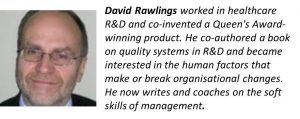… and confidence will take you further.
There are plenty of reasons for thinking that the world has changed quite fundamentally in the past year. Election and referendum results went against poll predictions to bring in (apparently) new political orders and priorities in the United Kingdom and the United States, and with them the prospect of similar changes in several other countries. Even the way that news is reported seems to have crossed a line and “truth” no longer means what it used to.
None of this was expected and you may be wondering just what can be relied on to stay the same. But is it ever justified to expect the good times to go on indefinitely? And when things are bad, why shouldn’t they get even worse?
You can always analyse the course of events after they’ve happened and commentators, now looking back, describe the financial crash as “inevitable”, although very few saw that inevitability in advance. And, now, the backlash of the “forgotten” is beginning to be talked about as if it should have been foreseen and could have been deflected.
Once you know the outcome, the historical signs pointing to it are obvious while the irrelevant details that made prediction so difficult dissolve from memory. This makes history appear to be pre-destined.
Of course, we know that life isn’t really like that. Small incidents can have major consequences, rendering the system chaotic. And what we do right now can change the course of events.
Similarly, personal circumstances aren’t determined by their past trajectory. Although you might sometimes empathise with the old saying: “If I wanted to get to there I wouldn’t start from here”, what actually matters isn’t where you are, rather it’s the direction you choose to move in.
That’s a summary of the logical, rational argument for setting goals and making plans irrespective of past history and current disadvantages.
So why don’t we always (or ever) do the logical, rational thing?
The answer, as suggested above, is that we fear the worst. A positive outcome can’t be guaranteed, so we don’t take the action that’s needed. Usually, and ironically, this makes the feared outcome much more likely to occur.
What you need in order to move, in what you know to be the right direction, is confidence.
So, are we talking about a blind faith that everything will turn out for the best? Well, that’s not quite what confidence is. It isn’t the same as believing that you’re infallible and that everything you attempt will be successful. “Confidence” accepts that the outcome is always uncertain but your actions can dramatically affect the odds.
For example, Heather was a seemingly successful woman with a Master’s degree in management studies working in local government. She was ambitious and looking for the next career step. But she told me that she “lacked confidence in interviews” so couldn’t progress. It turned out that she felt a need to be accepted and validated by others and didn’t know how to balance this with the demands of managing a team. Consequently, she doubted her ability to do the higher level job and expected the interviewers to see this. She imagined herself rejected before the interview even started.
Recognising that she would grow into the management role, and therefore didn’t need to be fully equipped for it yet, she was able to focus on the details of her actual performance in the interview: what to say and how to say it. And, when she constructed a mental image of the panel members smiling and nodding their approval, she felt confident. At the same time she accepted that she still might not get the job, but was able to perform as if success were certain.
As you make your plans for the coming year, you may be taking stock of your resources and perhaps feeling that you haven’t got everything you need. But you can work round the lack of most things as long as you have the ability to move forward in the face of uncertainty. It’s the critical skill – and always will be.
You can be confident of that!
By David Rawlings
 Email: david@changeworkcoaching.com
Email: david@changeworkcoaching.com




